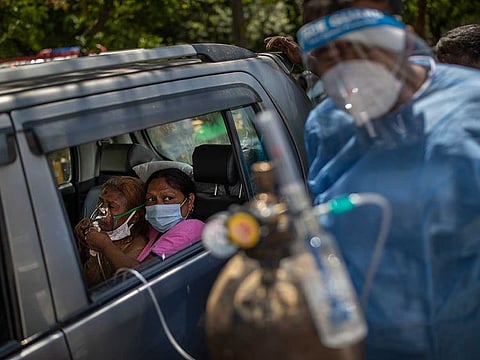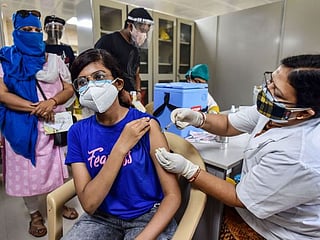Why the world should worry over India’s COVID-19 crisis
India's coronavirus situation may have significant implications in an interconnected world

The ongoing Covid crisis in India is probably one of the worst humanitarian crises the world has witnessed in recent memory. The virus is on the rampage, spreading from urban centres to rural hinterlands and mutating at its will.
Data on new cases and deaths is fuzzy at best, agencies are unprepared and overwhelmed, oxygen and hospital beds are still in short supply, and more worryingly, no one can even guess when this desperate situation will come to an end.
The rapidly deteriorating Covid situation in India has made the world alarmed and nervous. Breaking a self-imposed ban, the Indian government has been receiving emergency aid from various parts of the world. Despite the reports of aid not reaching the needy, the international community is doing everything to support India. Besides basic humanitarian concerns, the world has a lot to worry about India.
What makes the world nervous about India’s Covid crisis? The reasons are many:
India’s devastating second wave has raised serious doubts over the hope of an early global recovery from the Covid pandemic. The massive number of Covid cases and deaths in a country of the size of India can dramatically change the global data on the virus and its spread. For over a week now, India’s new Covid cases are almost half of the global number. The trend does not look to take a different direction soon.
The suppression of Covid data in India have not been very helpful for a global strategy to contain and control the virus. Not being open over finding a double mutant in October 2020 has already made that mutant travel to other countries.
With such an astonishing speed, the pandemic is gulping the country, and there are well-founded fears of India producing many more mutants of the virus. The new mutants will pose a bigger problem for even the countries hoping to get back to normality after vaccinating most of the population.
Largest diaspora community
India is the home country of world’s largest diaspora community. It will be almost impossible to isolate the country and stop spreading the virus and its different mutants outside India as its 18 million diaspora communities living in other countries will keep travelling between the homeland and the country of residence.
Moreover, countries dependent upon Indian migrant workers will face the challenges of getting a Covid-free workforce. Covid also threatens back-office work being done in India, particularly for North America and Europe.
India has the most extensive infrastructure in the world to produce vaccines. Though many rich countries have already got their vaccines, many poor developing countries are dependent upon affordable Indian vaccines. India has a long track record of producing dependable and less expensive medicines and vaccines.
Given the present situation, India will need a miracle to continue its vaccine productions as per its potential. The failure to get Indian vaccines will delay the global vaccination program and prolong the life of the pandemic.
India is the 5th largest economy in the world. At the beginning of April, the IMF had projected 12.5% GDP growth for India, and it was one of the reasons for hope for a post-pandemic global economic recovery.
Surprisingly, IMF had bought the story given to them by the Indian government that the country has recovered from the pandemic, but the fury of the second wave has destroyed the hope. Being the third-largest oil importer, India’s continuing Covid crisis also threatens a global oil recovery and has panicked the global oil market.
The Covid crisis in India and its implications for regional and national security and development also worry the world. The virus is fast moving out of India and affecting neighbouring countries. The situation in Nepal and Bangladesh looks precarious. The border closure and blame game among the countries further worsens the bilateral relations in a highly volatile South Asian region.
India’s growing pandemic troubles at its home-front have started to raise questions against the regime and its preparedness and performances. More people have started criticising the political leadership, and the government has been pushed to back foot. In this situation, authorities are likely to raise the nationalism pitch further.
Moreover, India’s grave Covid crisis has not only pushed the government institutions and agencies to the margin, but it has also started giving opportunities to religious, caste groups and activists to capture the space left by the retreating state.
Providing relief, medical and emotional support, radical groups can garner further support base for themselves, and their divisive ideology will weaken the constitutional forces in the country.
Covid crisis in India has a much more significant implication in an interconnected, interdependent world. The concerns are not limited to public health or economic; there are serious geopolitical and regional, and national security implications as well.
If the dreaded coronavirus is not controlled fast in India, it can potentially spiral into a massive challenge for the rest of the world in the short and long term.
Sign up for the Daily Briefing
Get the latest news and updates straight to your inbox










